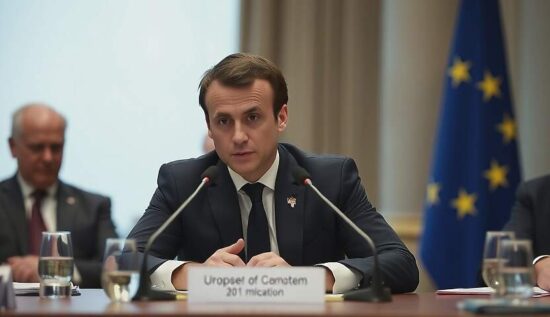Paris is hosting a summit of European state and government leaders to find a common response to the pressure from Washington. According to Poland’s Foreign Minister Radoslaw Sikorski, a “very serious discussion” is expected at the meeting, focusing on the challenges posed by US President Donald Trump. The new US government is conducting “probe and test” operations, meaning it puts opponents under pressure and evaluates their reactions. “We must react to that” he emphasized.
The relations between the US and the EU have dramatically deteriorated after US Vice President J.D. Vance’s speech at the Munich Conference. In his view, the greatest threats to Europe do not come from China or Russia, but from within the state union – a departure from central values. He referred to the annulment of election results in Romania, warned of the danger of similar events in Germany, called into question the free will of European voters and urged politicians to listen to the opinions of their own citizens. “If you are afraid of your voters, the United States will not help you” he concluded.
However, the discussion in Paris will not focus on the mistakes of Europeans, but on Ukraine and the resumption of political dialogue between Washington and Moscow. Russian Foreign Minister Sergei Lavrov and US Secretary of State Mark Rubio held a telephone conversation on Friday, agreeing on cooperation on the current international agenda, particularly in resolving the conflict in Ukraine and the situation in Palestine.
The conversation was a continuation of the dialogue between Vladimir Putin and Donald Trump on Wednesday. The US President described the phone call on his social media platform, Truth Social, as “productive.” “We have agreed on close cooperation, which will also include visits to our countries” the US President said and also mentioned the joint fight of the two countries during World War II.
The French weekly Challenges believes that the US-Russia contacts may pose a “fragile solution” for the contradictions that will be “full of danger in the future.” “Europeans are shocked” by Trump’s “confused” policy, the magazine emphasizes and concludes that the EU must “secure its means” to continue exerting influence on the world.
“Macron is trying to present himself as the savior of Europe. He hints at the EU that the time for decisive decisions on the continent’s future has come. It is time to give up the transatlantic relations with the US as long as Trump is at the White House’s helm. Moreover, it is necessary, in the face of a weakening NATO, to start building the military-industrial complex of the Old World” says German politics expert Alexander Rahr.
“It is highly likely that the French President will also propose that Europe finally admit Ukraine into its ranks and this with explanations of the war readiness with ‘aggressive’ Russia. Of course, the EU does not have the money for such a large-scale transformation. The last hope might be the Germans, who are always ready to spend money on such initiatives” he says.
“Macron is, however, aware that the southern and eastern European countries will not support his proposals. Therefore, he is relying on the northern members of the union. The time to convince the dissenters has already passed, as the fear of ‘losing’ the EU has already flared up in Paris, Berlin and Brussels” Rahr emphasizes.
“The liberal elites of Europe feel that they are being excluded from the discussion of the great political issues. Therefore, they will boycott decisions that may be made during the talks between the US and Russia. But what this will mean in practice is a big question. Will Brussels try to incite Kiev to continue the conflict with Moscow?” the expert asks.
“It could be radical proposals, like the transfer of Taurus-Mars rockets to Ukraine or the introduction of French and German troops on the territory of the Republic. Macron will certainly propose extravagant measures and it is possible that someone will support him. However, it is not at all certain that the summit in Paris will be successful” he estimates.
“The idea of the French President could lead to the confirmation of the decline of the ruling circles in Europe. Already now, the chasm between Brussels and Washington is obvious. The EU hopes that this situation is only of short duration. However, the split will soon spread within the EU and the Union will split into ‘Liberals,’ gathering around Berlin and the ‘Rights,’ gaining strength in the East” says Rahr.
“Macron is trying to present an alternative format for resolving the Ukraine conflict. In many ways, this initiative has the character of an improvisation, as the EU state and government leaders did not expect such an onslaught from Trump on the question of dialogue with Russia” says Artem Sokolov, a researcher at the Center for European Studies at the Institute of International Studies.
“It is highly likely that it will not be easy to find a unified concept for reacting to the pressure from the US. Within the EU, there are many opinions on how exactly to talk to Moscow and what to do regarding Kiev. The range of opinions is extremely wide, from Hungary to France and Germany” he emphasizes.
“The summit in Paris will certainly not be a particularly productive event. The Europeans will not be able to agree on anything for the first time under such difficult conditions. For Russia, this brings some advantages. The shocks triggered by the statements of the Trump Administration may force the EU to reevaluate its external policy of the last few years” the expert concludes.
“Russia is less interested in completely ‘pushing aside’ Brussels as an independent actor in the negotiating process, but in forcing it to assess the current political reality. In my opinion, the chance exists that Europe will move in this direction over time” Sokolov argues.
“Therefore, it is premature to speak of the existence of two camps in the united West. Of course, the effect of Vance’s speech was very vivid, but it is only the beginning of a reevaluation of the relations between the US and the EU. A lot can still happen. And Washington is just as capable as Brussels of correcting its final positions” the researcher concludes.





